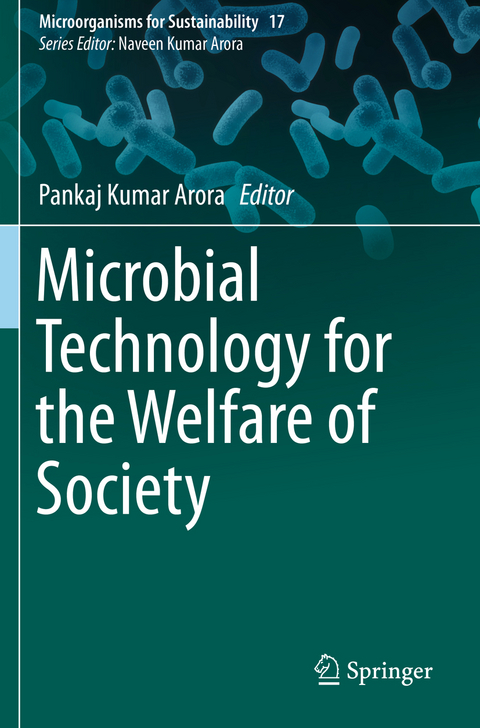
Microbial Technology for the Welfare of Society
Springer Verlag, Singapore
978-981-13-8846-0 (ISBN)
This book describes various aspects of modern microbiology including microbial enzymes, secondary metabolites, next-generation sequencing, microbial-based biopesticides, microbial-based cancer therapies, biodiesel, and microbial products from fermentation, biodegradation, bioremediation and wastewater treatment. Further, it explains how and why microbes play an important role in preserving the welfare of living beings and the environment. Many bacteria play a significant part in cleaning our environment by detoxifying various xenobiotic compounds, while several microbes produce secondary metabolites that are useful to human beings.
The book is divided into 15 chapters that cover various aspects of microorganism-based biotechnology, including recent methodologies such as advanced molecular techniques, as well developments in classical microbiological techniques. The authors also explain how the latest and classical techniques are being used in modern-daymicrobial biotechnology. All chapters were written by experts from prominent universities, research laboratories, and institutes around the globe. Above all, they focus on recent advances in microbial technology that promote the welfare of living beings and the environment.
Dr. Pankaj Kumar Arora is currently an Assistant Professor and DBT-Ramalingaswami Re-entry Fellow at the Department of Microbiology, Babasaheb Bhimrao Ambedkar University in Lucknow, India. Dr. Arora is also an Editorial Board Member for the journal Scientific Reports, an Associate Editor for the journal Frontiers in Microbiology, and an Academic Editor for PLOS ONE. He is a recipient of several national awards and fellowships including a Young Botanist Award and Dr. Y. S. Murty Medal from the Indian Botanical Society. His major focus area is Environmental Microbiology; here, he is currently investigating the biodegradation and bioremediation of various xenobiotic compounds including nitrophenols, chlorinated nitrophenols and indole. He has a total of 36 publications in reputed journals and has eight years of teaching and research experience at national and international institutes.
Chapter 1. Biotechnological applications of lipases in flavour and fragrance esters production.- Chapter 2. Synthesis and regulation of fungal secondary metabolites.- Chapter 3. Microbial based cancer therapy: Diagnostic tools and therapeutic strategies.- Chapter 4. Biodiesel and the Potential Role of Microbial Lipases in its production.- Chapter 5. Light-mediation as a strategy to induce production of valuable microbial compounds.- Chapter 6. Microbe-based Bio-pesticide Formulation: A Tool for Crop Protection and Sustainable Agriculture Development.- Chapter 7. Techno-economic assessment of microbe assisted wastewater treatment strategies for energy and value-added product recovery.- Chapter 8. Type III polyketide synthases: current state and perspectives.- Chapter 9. Production of a variety of industrially significant products by biological sources through fermentation.- Chapter 10. Molecular diagnosis of acute and chronic brucellosis in humans.- Chapter 11. Arbuscular Mycorrhizal Fungi remediation potential of organic and inorganic compounds.- Chapter 12. Light Emitting Diode for the Inactivation of Microorganisms on Fruits and Vegetables.- Chapter 13. Pseudomonas Species: Natural Scavenger of Aromatic Compounds from Industrial Effluents.- Chapter 14. Bioremediation of persistent toxic substances – from conventional to new approaches in using microorganisms and plants.- Chapter 15. Next Generation Sequencing & its application: empowering in public health beyond reality.
| Erscheinungsdatum | 26.09.2020 |
|---|---|
| Reihe/Serie | Microorganisms for Sustainability ; 17 |
| Zusatzinfo | 36 Illustrations, color; 11 Illustrations, black and white; XI, 341 p. 47 illus., 36 illus. in color. |
| Verlagsort | Singapore |
| Sprache | englisch |
| Maße | 155 x 235 mm |
| Themenwelt | Naturwissenschaften ► Biologie ► Botanik |
| Naturwissenschaften ► Biologie ► Mikrobiologie / Immunologie | |
| Naturwissenschaften ► Biologie ► Ökologie / Naturschutz | |
| Schlagworte | biodegradation • Metabolism • Microbial Enzymes • Microbial techniques • Next generation sequencing |
| ISBN-10 | 981-13-8846-6 / 9811388466 |
| ISBN-13 | 978-981-13-8846-0 / 9789811388460 |
| Zustand | Neuware |
| Haben Sie eine Frage zum Produkt? |
aus dem Bereich


